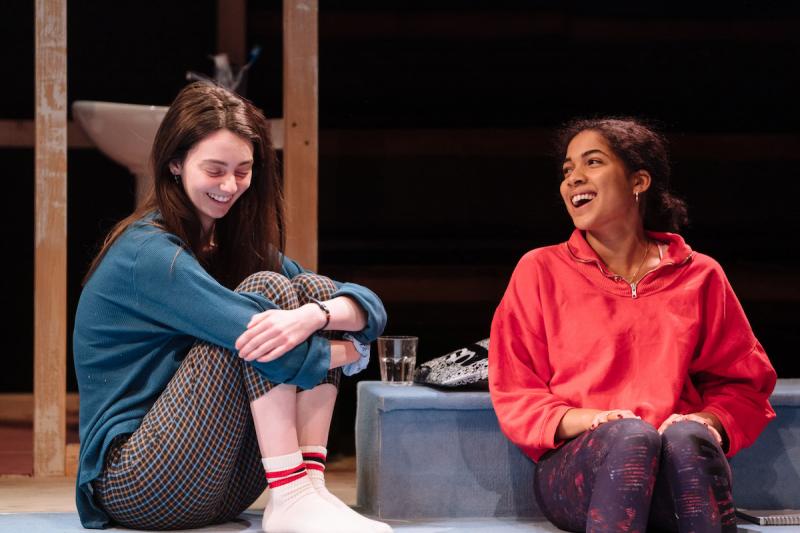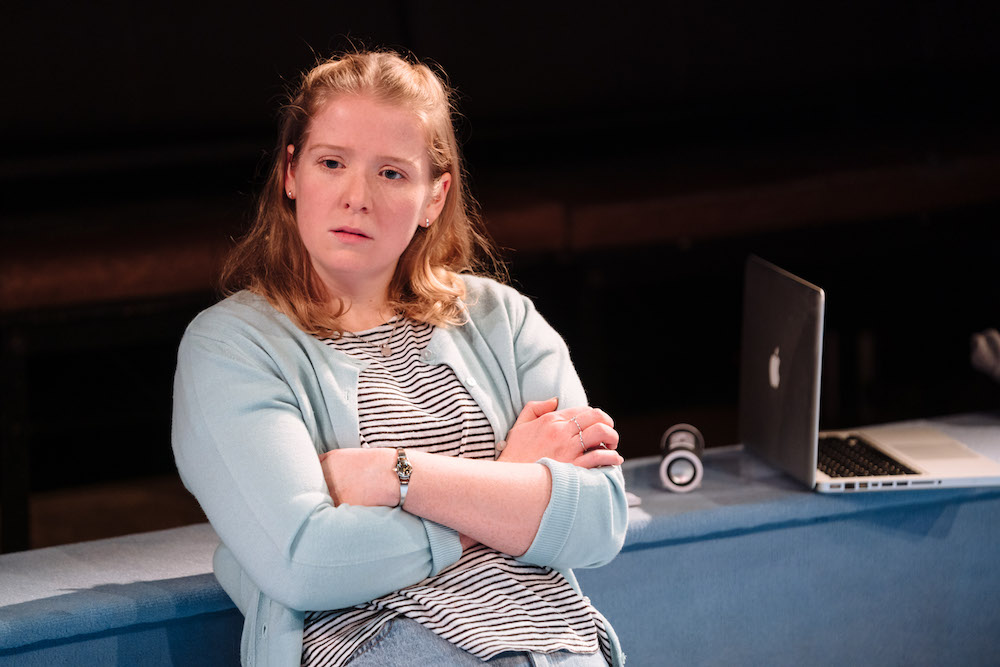Scenes with Girls, Royal Court review - feminist separatism 2 0 | reviews, news & interviews
Scenes with Girls, Royal Court review - feminist separatism 2.0
Scenes with Girls, Royal Court review - feminist separatism 2.0
New play about female friendship is refreshingly original and dazzlingly exciting

Last night, I discovered the gasp index. Or maybe just re-discovered. The what? The gasp index. It's when you see a show that keeps making you exhale, sometimes audibly, sometimes quietly. Tonight I gasped about five times, then I stopped counting – I was hooked.
As the title makes clear, the piece is composed of 22 short scenes which just feature young women. It's a flatshare drama about three 24-year-olds: Tosh and Lou live together, and they know another young woman called Fran, who used to live in the same place. In the playtext, the epigraph is from a brilliant novel, Emma Cline's The Girls: "Poor girls. The world fattens them on the promise of love. How badly they need it, and how little most of them will ever get." The world's narrative is boy meets girl, they have sex, they marry, and then come the kids. The subtext, often spoken out loud, is that the girl is validated by the man: her existence is made real because of the men she knows, because of the man she goes out with.
Now Tosh and Lou have decided to contest this narrative, this ideology, this normal, or normative, situation. Instead of using men to confirm their identity they have determined to do without them. Well, sort of. As an alternative, Tosh and Lou have given up on regular lovers, but they are not the same in their behaviour. While Lou has sex with different partners, she doesn't have a steady boyfriend; even more radically, Tosh has nothing to do with men. She says they don't interest her. She doesn't need them. But gradually both of these ways of living begin to raise some obvious issues: how far can such choices be rational? Are they just a reaction to early life experiences? How can you rebel against normative situations in a healthy way?
 As time passes, the strains in Tosh and Lou's relationship become more intense. Neither want to have sex with women, but their emotional lives are complex and ever-shifting. They are a couple. Both are well educated and articulate so they discuss their feelings with, apparently, a clear consciousness. Apparently. At the same time, they are often visited by their friend Fran. Fran is different. She has met Mister Right. She can't stop talking about him. In fact, they are going to get married. She is part of the narrative of normality, and so she is the victim of stinging critical comments from both Tosh and Lou.
As time passes, the strains in Tosh and Lou's relationship become more intense. Neither want to have sex with women, but their emotional lives are complex and ever-shifting. They are a couple. Both are well educated and articulate so they discuss their feelings with, apparently, a clear consciousness. Apparently. At the same time, they are often visited by their friend Fran. Fran is different. She has met Mister Right. She can't stop talking about him. In fact, they are going to get married. She is part of the narrative of normality, and so she is the victim of stinging critical comments from both Tosh and Lou.
Battye writes this story, with some lovely twists and turns, with enormous freshness and laser-sharp perceptiveness. The dialogues have a gob-smacking vitality and originality. As well as the interaction between the women, she pens some short scenes – charmingly called "Hooptedoodles" – that, true to the word's definition, hold up the narrative, but briefly, and in a good way. The stand-out phrases come thick and fast – "throw up a kidney"; "we are not just sediment"; "human equivalent of a lasagna" – and Battye's writing sparkles with both provocative ideas and emotional resonance. It's great. So you can easily forgive the slightly slender quality of the entertainment.
On a personal level, there is a sharp contrast between Tosh, who is very cool and intellectual ("theoretical"), and Lou, who is more instinctive and spontaneous ("practical"). Their common ground is not only their idea of separatist politics, both also that they think that Fran is stupid. But is she really? Battye brightly satirises the bechdel test because Tosh and Lou and Fran talk only about men, and about sex, and their own relationships are left to peek out between the pauses in this explicit chat. She touches on the possibility that some women can have coercive control over other women, that school girls bully each other, and suggests that all same-sex friendships are a form of love. What, she asks, is female pain? And is giving up sex a wise act or just frigidity?
Sympathetically directed by Lucy Morrison, and neatly designed by Naomi Dawson, Scenes with Girls is like an exciting blast of fresh air blowing through the often stale world of contemporary new writing. Its youthful appeal is enhanced by excellent performances from Sex Education's Tanya Reynolds as Tosh, making her theatre debut, and Rebekah Murrell's Lou, with similarly good work from Letty Thomas (pictured above) a welcome contrast to the high-energy of the other two. All three are completely convincing, whether they are tentative, joyful or hit by agony. It's very early days, but if the rest of this year's new writing offer is half as good, I will be in heaven.
rating
Explore topics
Share this article
The future of Arts Journalism
You can stop theartsdesk.com closing!
We urgently need financing to survive. Our fundraising drive has thus far raised £49,000 but we need to reach £100,000 or we will be forced to close. Please contribute here: https://gofund.me/c3f6033d
And if you can forward this information to anyone who might assist, we’d be grateful.

Subscribe to theartsdesk.com
Thank you for continuing to read our work on theartsdesk.com. For unlimited access to every article in its entirety, including our archive of more than 15,000 pieces, we're asking for £5 per month or £40 per year. We feel it's a very good deal, and hope you do too.
To take a subscription now simply click here.
And if you're looking for that extra gift for a friend or family member, why not treat them to a theartsdesk.com gift subscription?
more Theatre
 Juniper Blood, Donmar Warehouse review - where ideas and ideals rule the roost
Mike Bartlett’s new state-of-the-agricultural-nation play is beautifully performed
Juniper Blood, Donmar Warehouse review - where ideas and ideals rule the roost
Mike Bartlett’s new state-of-the-agricultural-nation play is beautifully performed
 The Gathered Leaves, Park Theatre review - dated script lifted by nuanced characterisation
The actors skilfully evoke the claustrophobia of family members trying to fake togetherness
The Gathered Leaves, Park Theatre review - dated script lifted by nuanced characterisation
The actors skilfully evoke the claustrophobia of family members trying to fake togetherness
 As You Like It: A Radical Retelling, Edinburgh International Festival 2025 review - breathtakingly audacious, deeply shocking
A cunning ruse leaves audiences facing their own privilege and complicity in Cliff Cardinal's bold theatrical creation
As You Like It: A Radical Retelling, Edinburgh International Festival 2025 review - breathtakingly audacious, deeply shocking
A cunning ruse leaves audiences facing their own privilege and complicity in Cliff Cardinal's bold theatrical creation
 Edinburgh Fringe 2025 reviews: Refuse / Terry's / Sugar
A Ukrainian bin man, an unseen used car dealer and every daddy's dream twink in three contrasting Fringe shows
Edinburgh Fringe 2025 reviews: Refuse / Terry's / Sugar
A Ukrainian bin man, an unseen used car dealer and every daddy's dream twink in three contrasting Fringe shows
 Faustus in Africa!, Edinburgh International Festival 2025 review - deeply flawed
Bringing the Faust legend to comment on colonialism produces bewildering results
Faustus in Africa!, Edinburgh International Festival 2025 review - deeply flawed
Bringing the Faust legend to comment on colonialism produces bewildering results
 Edinburgh Fringe 2025 reviews: Imprints / Courier
A slippery show about memory and a rug-pulling Deliveroo comedy in the latest from the Edinburgh Fringe
Edinburgh Fringe 2025 reviews: Imprints / Courier
A slippery show about memory and a rug-pulling Deliveroo comedy in the latest from the Edinburgh Fringe
 Edinburgh Fringe 2025 reviews: The Ode Islands / Delusions and Grandeur / Shame Show
Experimental digital performance art, classical insights and gay shame in three strong Fringe shows
Edinburgh Fringe 2025 reviews: The Ode Islands / Delusions and Grandeur / Shame Show
Experimental digital performance art, classical insights and gay shame in three strong Fringe shows
 Edinburgh Fringe 2025 reviews: Ordinary Decent Criminal / Insiders
Two dramas on prison life offer contrasting perspectives but a similar sense of compassion
Edinburgh Fringe 2025 reviews: Ordinary Decent Criminal / Insiders
Two dramas on prison life offer contrasting perspectives but a similar sense of compassion
 Edinburgh Fringe 2025 reviews: Kinder / Shunga Alert / Clean Your Plate!
From drag to Japanese erotica via a French cookery show, three of the Fringe's more unusual offerings
Edinburgh Fringe 2025 reviews: Kinder / Shunga Alert / Clean Your Plate!
From drag to Japanese erotica via a French cookery show, three of the Fringe's more unusual offerings
 The Two Gentlemen of Verona, RSC, Stratford review - not quite the intended gateway drug to Shakespeare
Shakespeare trying out lots of ideas that were to bear fruit in the future
The Two Gentlemen of Verona, RSC, Stratford review - not quite the intended gateway drug to Shakespeare
Shakespeare trying out lots of ideas that were to bear fruit in the future
 Edinburgh Fringe 2025 reviews: The Horse of Jenin / Nowhere
Two powerful shows consider the Israeli-Palestinian conflict, with mixed results
Edinburgh Fringe 2025 reviews: The Horse of Jenin / Nowhere
Two powerful shows consider the Israeli-Palestinian conflict, with mixed results
 Edinburgh Fringe 2025 reviews: The Fit Prince / Undersigned
A joyful gay romance and an intimate one-to-one encounter in two strong Fringe shows
Edinburgh Fringe 2025 reviews: The Fit Prince / Undersigned
A joyful gay romance and an intimate one-to-one encounter in two strong Fringe shows

Add comment